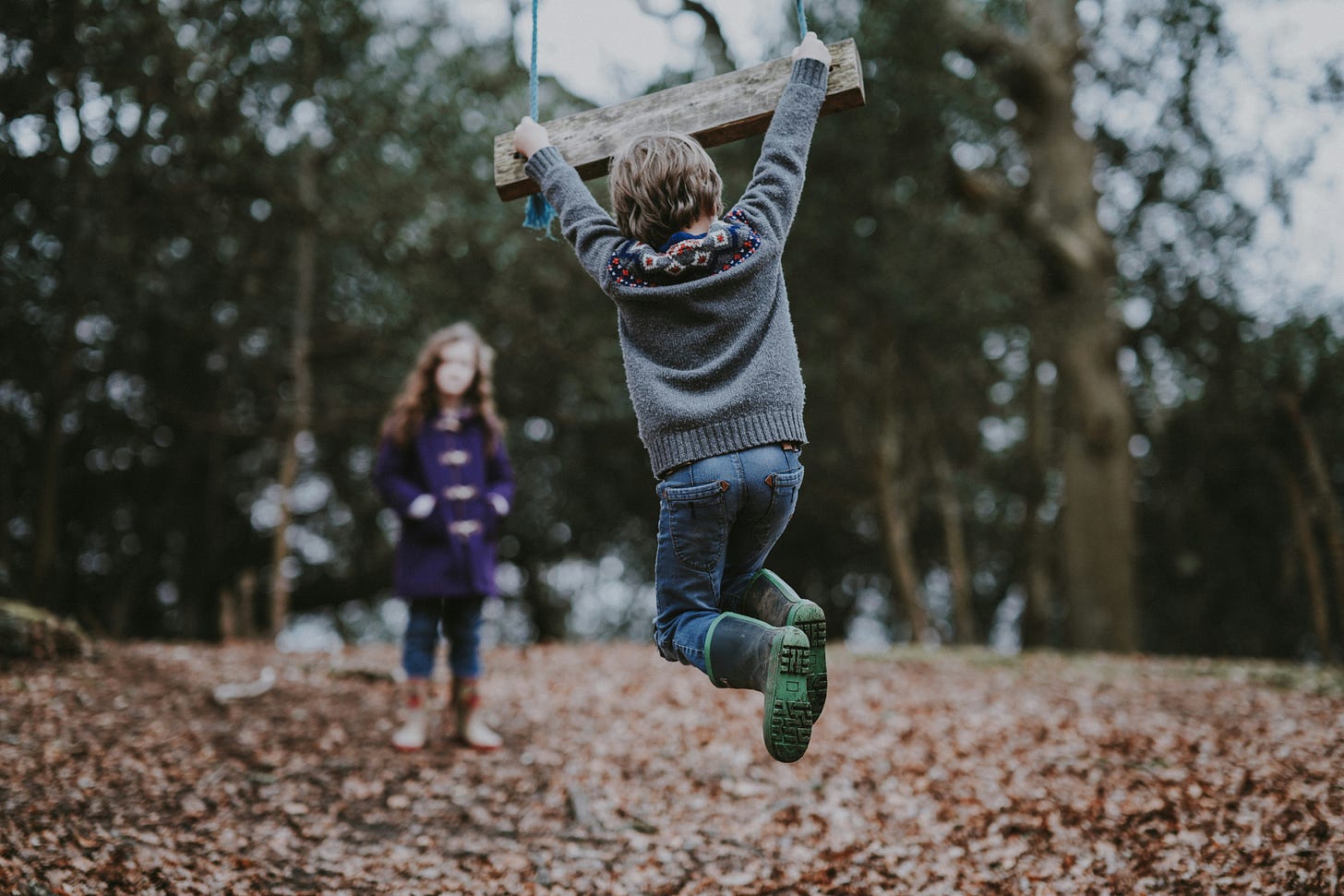“Children should be as safe as necessary, not as safe as possible”
On the risky business of wild, free play and the possibility that screen time isn’t actually THAT bad
Every fortnight I round up the most interesting and insightful writing about British Gen Alphas (born 2010-2024) from across the internet so you can stay bang up to speed on this emerging and fascinating cohort.
This time we’re talking: risky play, vegan snacks and whether “brain rot” is a myth. Let’s go!

Why kids need to take more risks: science reveals the benefits of wild, free play
By Julian Nowogrodzki for Nature
Here risky play is defined as “thrilling and exciting play that involves uncertainty and a risk - either real or perceived - of physical injury or getting lost”, and this piece cites recent research that shows opportunities for it are crucial for kids’ healthy physical, mental and emotional development. Though risky play helps to develop spatial awareness, coordination, tolerance of uncertainty and confidence, today parents are struggling to permit (let alone encourage) it - so Alphas are missing out. Surely, anyone who's so much as passed through a playground with helicopter parents hovering nearby has seen this reality in the UK today. Quick game of hide and seek in the deep, dark woods, anyone?
How Deliciously Kids nourishes UK Alphas’ snacking habits
By Kathryn Morrisby for Canvas8
Oooh what’s this? Two for two on featuring myself in my own Substack? All this Alpha-ing must finally be rubbing off on me. Here I track the launch of the new kids’ range from early-noughties, plant-based pioneers Deliciously Ella highlighting that although some research suggests children want more ethical options (39% of UK parents say their child wants to eat fewer animal-derived products - like meat and milk - due to their sustainability concerns) when there is such widespread food insecurity across the UK, a premium snack brand like this will be out of reach for many families. Even those with the most eco of intentions.
Should Kids Really Learn About Getting Rich?
By Kathryn Jezer-Morton for The Cut
This one is interesting in the context of the many, many (many) pieces I’ve already featured here about how interested in and savvy about finances Alphas are. This piece is more focused on finfluencer-following Gen Zers who, in their lack of actual financial (or media) literacy, have bought into the notion of “manifesting wealth” by becoming “vaguely defined entrepreneurs.” My sense is that Alphas won’t fall into this trap of under-preparedness - but that will rely on financial education (both at home and in school) improving. This piece also taps into an interesting question about “earning” or simply receiving pocket money that I see as ripe for further investigation. Watch this space.
Is internet-induced brain rot a myth?
By Halima Jibril for Dazed
Oxford University Press may have named "brain rot" as its 2024 word of the year, but Oxford professor Andrew Przybylski and other academics are here rejecting the idea that our screens are lobotomising us. Przybylski criticises low-quality research that (1) gets coverage because it confirms our preexisting biases about technology and (2) gets exaggerated to get attention and funding. In a 2023 study of (American) Gen Alpha, in which he says the Ts were crossed and the Is firmly dotted, he found no connection between screen time, brain connectivity, or well-being. His advice? “Be smart about how you use your devices. Manage the devices – don’t let them manage you.”
When kids set their parents’ screen time rules: ‘I hit my limit before I even get out of bed’
By Zoe Williams, Gynelle Leon and Tim Dowling for The Guardian
In the spirit of managing screentime, here we have three Guardian writers handing over the reins (or should that be lock screens?) to their offspring with results that are more heartwarming than surprising. Of course, the kids involved take active pleasure in the new power dynamic and the writers, who initially struggle under tighter restrictions, emerge with a new, enlightened outlook. Did it make me look back at my own screen time for this year so far? Yes, yes it did. I’ll tell if you will.



